The Pledge of Allegiance
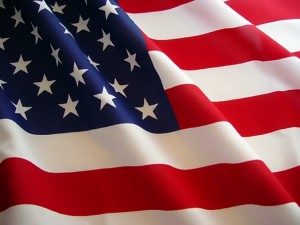 Alex Tabarrok has some strong thoughts on the Pledge of Allegiance.
Alex Tabarrok has some strong thoughts on the Pledge of Allegiance.
He points to an old essay by Gene Healy which asks, “What’s Conservative about the Pledge of Allegiance?” and notes its origins as a quasi-communist mantra. That’s amusing on a number of levels. He also reminds us that a stiff arm salute was once the preferred stance whilst taking the pledge, until Adolf Hitler co-opted the gesture.
Even aside from that, Tabarrok finds the Pledge “creepy.”
I wouldn’t go that far but I tend to share his distaste for the ritual. My reasons aren’t libertarian, however, but quite conservative. It’s not so much that I find taking oaths distasteful or contrary to our Republican spirit but, rather, that I take my oaths seriously.
Let’s look at the Pledge of Allegiance:
I pledge allegiance to the flag of the United States of America,
I’m sorry, but I feel no allegiance to the flag. It’s a piece of cloth. I owe it nothing.
I’m attached to it as a symbol, to be sure, and reflexively observe certain courtesies in certain ceremonies involving it as a symbol. And, in the right circumstances, I find myself moved by its display or angered by its abuse. But only, I stress, because of what it represents.
Which, of course, brings us to the next line:
and to the republic for which it stands,
Why not just say “I pledge allegiance to the United States of America” and be done with it?
This also brings me to a much more fundamental objection to the Pledge. I have taken, multiple times in fact, oaths to the Republic in the context of military service. There, however, it was precisely clear what it was I was swearing to do: Defend the country from all enemies, foreign or domestic, through violent means, if necessary, at the risk of life and limb.
Conversely, what is it that school children are being asked to do when they take the Pledge? Not a damned thing, that’s what. Indeed, most of them likely haven’t a clue as to what they’re reciting. That’s not an oath, it’s meaningless nonsense that’s an insult to oaths everywhere.
one nation under God
I simply don’t believe this to be true. I don’t think there’s a God, let alone that we’re somehow subordinate to him. A lot of others agree.
I’m not offended, for example, that In God We Trust appears on my coins. Most Americans do in fact believe that there’s a God and do in fact trust in such a being and derive some comfort from that belief. It does me no harm to acknowledge that fact on my legal tender.
Having people recite it as part of a loyalty oath, however, is problematic. At best, it further dilutes the Pledge into a mere social custom.
indivisible
I seldom give this one much thought but, really, it’s silly. For one thing, we are in fact divided. We’re a Federal system that still maintains the legal fiction that each of the 50 states hold a divided sovereignty. Further, it’s an obvious poke in the eye of Southern secession which I continue to believe was perfectly legal if ill advised.
with liberty and justice for all.
Presuming that this construction is meant to be parallel, does anyone truly believe in liberty for all? I don’t believe criminals should all be freed, for example.
I believe in justice for all, of course, although I’m not sure what it has to do with anything. Presumably, it’s helping explain why it is that the Republic deserves allegiance. But one would think one would have considered the merits of the thing before taking the oath.
As a general rule, my preference is for oaths and other patriotic paraphenalia to be confined to their proper occasions. The National Anthem should be played on the 4th of July and where it’s otherwise appropriate. This does not include, for example, random baseball games. People should take oaths when they mean them and are prepared to actually do something about them.

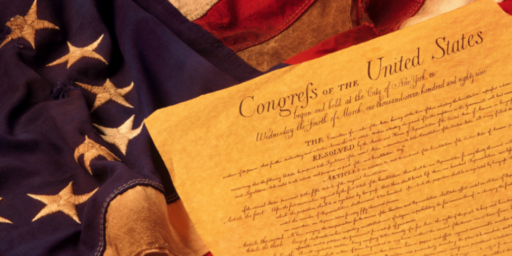
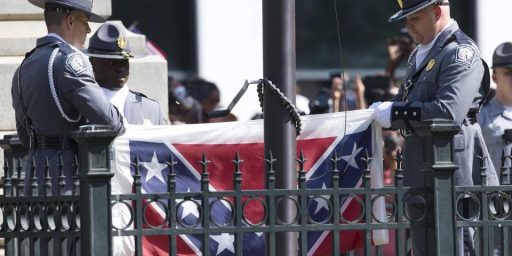
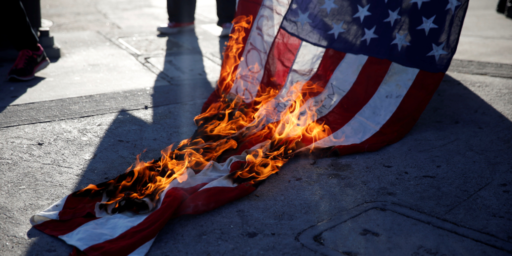
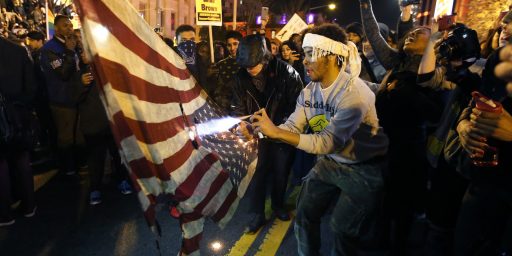

I’m old enough to remember reciting the pledge without “under God” part–that was put in the 50s to show them godless commies where we Americans stood. I’m pretty sure we children didn’t take the pledge to be an oath (I’m pretty sure we didn’t know what an oath was). It was something we recited each morning, and I think we believed it told us something about the idea of our country, a kind of mini-civics lesson. And I do remember that the last part, with liberty and justice for all, stuck in my head–and kinda still does, your (well-taken) gloss twithstanding.
I feel about the same way when looking at the pledge as an oath of sorts. I still respect the pledge as a tradition. It’s been around long enough to be a tradition and even in it’s present form.
So here we are stuck with it, warts and all. What bothers me the most are the people who use the pledge as a tool to poke at others. It’s not even about the pledge as much as it’s about those who support it and those who want to irritate them. Why not just let it be? It’s not that big a deal.
My point, exactly.
James, I do believe in G*d, but I think its wrong to compel people to say it.
“”At best, it further dilutes the Pledge into a mere social custom.””
“”””””””””””””””””””””””””””””””””””””””””””””””””
You greatly underestimate the power and importance of “mere social custom”, [and by implication that of ritual,tradition, and sacrament] to the very fabric and existence of any cohesive society.
Too many of us have “educated” our way out of too many important parts of civility and protocol, to our unfortunate loss.
While nationalism is good, jingoism is excessive, and iconoclasm should be a spice and not an entree’.
James;
I should make it clear that I think you have always shown yourself to be respectful and civil and that my comment was a broad observation and not intended to be a personal affront.
PD Shaw;
The exclusion of the phrase in question would exclude the possibility of the recital of the pledge by those who are aware of the source of their rights.
Even an Atheist should see the importance of government holding itself accountable to a higher authority, even if “God”, in this case, is only acknowledged only as a metaphor for immutable principle.
Please excuse my poor proof reading,the first “even” And the first “only” should have been expunged.
I really don’t care about the pledge, but I couldn’t disagree more about the Anthem. I love that we play the Anthem before our sporting events. I love that for the few minutes before every game, everyone is united as an American. My minor league football team has a local color guard raise the flag before home games, and I’m always thankful I live in a country where an idiot 30-yr old can put on the pads, run around and hit college kids if he wants to. Hell, even Browns fans and Steelers fans get along during the Anthem. Afterwards we go back to our firm belief that the Brownies will finally win the big one and that people from Pittsburgh are all inbred, but damnit, that doesn’t matter while the Anthem is being played.
I do take exception to the people who make it all about them, stretch the song out to 20 minutes of screeching and forget half the words. That I can’t stand at all.
Let me try:
“I’m not offended, for example, that We Are White appears on my coins. Most Americans are in fact white. It does me no harm to acknowledge that fact on my legal tender.”
“I’m not offended, for example, that We Are Female appears on my coins. Most Americans are in fact female. It does me no harm to acknowledge that fact on my legal tender.”
Defining who is to be considered ‘we’ (and who is left to be considered ‘them’) is not a trivial point. The National Motto is harmful. If you put in any other majority as a definition of ‘we’, then this becomes pretty clear immediately.
Religion has been engrained in our political culture since, quite literally, its inception.
Floyd, the current version of the pledge denies me the right to profess my belief that the St. Louis Cardinals are America’s baseball team.
More seriously, the preamble to the Declaration of Independence might be a more suitable public recitation. Its invocation of religion more ambiguous (and quite humanist); its historic significance unquestionable.
Southern secession which I continue to believe was perfectly legal if ill advised.
While I do agree with you on the pledge in general, you actually believe that treason in defense of slavery is legal?
Southern secession which I continue to believe was perfectly legal if ill advised.
Are you one of those folks who habitually refers to the conflict of 1861-65 as, “The War of Northern Aggression”???
Well spoken, Floyd.
James, in that same vein allow me to ask what may be seen as an overly personal question… (Though I hasten to point out that by definition, an oath is an extraordinarily personal thing.. and anyway you know me well enough to know I don’t dive into this stuff with you on malice)…
Question: Was your wedding a civil ceremony?
Given your objections to an oath before God, I would think that promising before God to love and Cherish only one other would be problematic, too.
I would argue it predates it.
I generally call it “The Civil War.”
But of course.
Seemed a reasonable angle of discussion for obvious reasons.
Right up until the Constitution established our United States. Similarly, racial and gender inequalities were engrained in our political culture since, quite literally, its inception (when blacks counted as 3/5 of a white and women couldn’t vote.)
Ours was.
One of the larger misconceptions I’ve seen today.
Drag out Lincoln’s Thanksgiving proclamation and tell me about how religion isn’t at the core of things, even 100 years after the constitution was in force.
Ubermitch;
If Lee was found not to be guilty of treason,then on what do you base your accusation?
If Lee was found not to be guilty of treason
Lee was never tried. In 1865 he swore allegiance to the United States in exchange for amnesty pursuant to an act of congress. Here is his actual signed actual oath document.
then on what do you base your accusation?
Also, I should add that I base my accusation of treason against Lee, and all other members of the Confederate military and government, on the fact that they actively waged a war against the constitutional government of the United States. Art. III, sec. 3 of the constitution states that “Treason against the United States, shall consist only in levying War against them, or in adhering to their Enemies, giving them Aid and Comfort.” That is what the Confederacy was. War against the United States. For the purpose of keeping black people as property.
Why then was slavery still legal in the union after the emancipation proclamation?
Your position is untenable, but obviously stubbornly held and non-temporal.May you sincerely enjoy it without further challenge.
“I don’t think there’s a God, let alone that we’re somehow subordinate to him. A lot of others agree.”
This must be like that consensus thing that proves scientifically that there’s a global warming crisis.
Go figure – in a time of war, a President invoking religion.
Drag out the Treaty with Tripoli and tell me about how religion is at the core of things.
“This must be like that consensus thing that proves scientifically that there’s a global warming crisis.”
Posted by DL
First, this is off-topic. Second, perhaps you should ask somebody who knows his *ss from a hole in the ground about the meaning of the term ‘scientific consensus’.
Pardon a European elbowing into an American conversation, but I’d just like to give you an outsider’s perspective.
It’s always seemed to me that America needs its big, broad self-definitions to keep its cohesion. Whereas smaller, more homogenous countries share similar values, America is a patchwork of regions that are sometimes have very little in common.
For Europeans, the fetishes for the flag, the Pledge, the self-definition as Leader of The Free World sometimes seem a touch corny and simplistic. But in essence, that’s kind of the point of them.
We’re the land of opportunity. We’re the home of the free. We’re Christian. It all has the feel of a national dialogue that happened a long, long time ago. But America needs its sweeping self-definitions. Without them it falls apart.
As someone who loves American culture and has visited the States many times, even I feel slightly unsettled by the Stars & Stripes in every yard that you see in some areas. It’s as if, to keep the national identity strong, the statements of patriotism need to be overpowering, conspicuous and ongoing, in a way that more naturally cohesive national identities do not feel the need for.